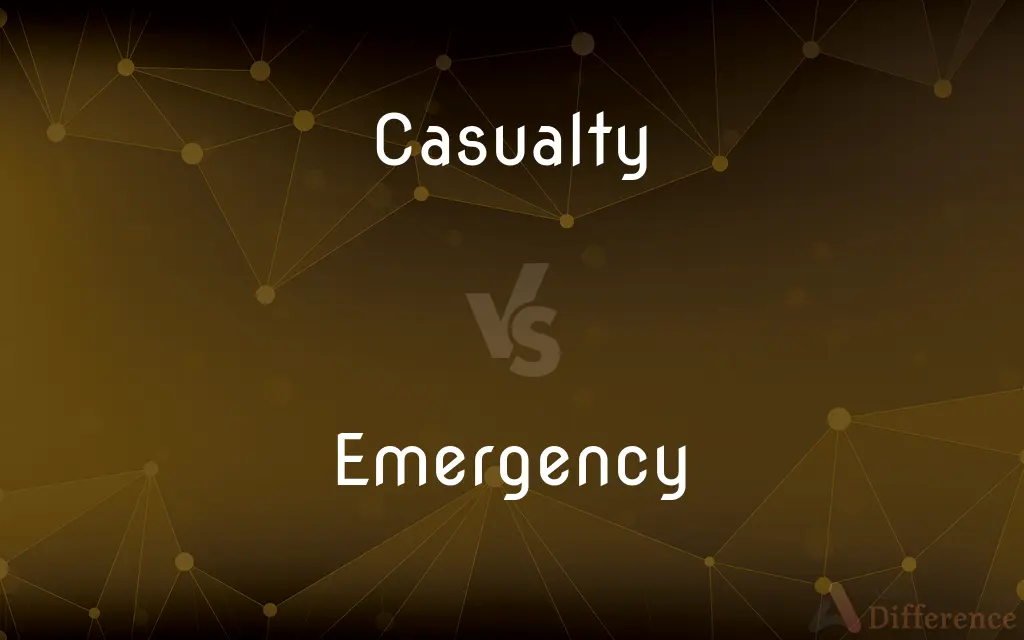Casualty vs. Emergency — What's the Difference?
By Tayyaba Rehman & Urooj Arif — Updated on March 30, 2024
Casualty often refers to a person injured or killed in an accident or conflict, while emergency denotes a sudden, urgent situation requiring immediate action.

Difference Between Casualty and Emergency
Table of Contents
ADVERTISEMENT
Key Differences
Casualty involves individuals experiencing harm due to accidents or conflicts, highlighting the human aspect. In contrast, emergency encompasses a wide range of urgent situations that demand immediate attention, not limited to human injuries but also including natural disasters, medical crises, or security threats.
Whereas casualty focuses on the aftermath of specific incidents affecting people, emergencies can be anticipated and prepared for through drills and safety plans, aiming to prevent or mitigate casualties and other forms of harm.
For instance, a casualty might result from an emergency situation like a car crash or a natural disaster. Conversely, declaring an emergency can mobilize resources and personnel to handle the situation effectively, possibly reducing the number of casualties.
The term casualty is often used in medical and military contexts to describe the individuals harmed, while emergency is a broader term used across various fields, including healthcare, law enforcement, and public safety, to describe situations that require immediate action to prevent or respond to harm.
Comparison Chart
Definition
A person killed or injured in a war or accident.
A serious, unexpected, and often dangerous situation requiring immediate action.
ADVERTISEMENT
Scope
Primarily refers to individuals affected.
Encompasses a broad range of urgent situations.
Context
Commonly used in medical and military scenarios.
Used across various fields, including healthcare, public safety, and natural disaster response.
Response
Focuses on the aftermath and treatment of affected individuals.
Involves immediate actions to prevent or address the situation.
Preparation
Less about preparation, more about response to incidents.
Often involves planning and drills to mitigate impacts.
Compare with Definitions
Casualty
Often used to refer to military personnel lost to service due to injury.
The battle's casualty count was higher than anticipated.
Emergency
Used to describe situations of natural disasters requiring rapid response.
The agency issued an emergency alert for the hurricane.
Casualty
Sometimes used in healthcare to describe the emergency department.
He was rushed to casualty after the accident.
Emergency
A situation that arises unexpectedly and requires urgent action.
Firefighters responded to the emergency call within minutes.
Casualty
Casualty can also imply a negative outcome or failure.
Their project was a casualty of poor planning and execution.
Emergency
Medical emergencies denote critical health situations demanding immediate care.
She was taken to the hospital with a life-threatening emergency.
Casualty
A person injured or killed in an accident or war.
The car crash resulted in several casualties needing immediate medical attention.
Emergency
In public safety, an emergency signals a need for immediate law enforcement response.
The police declared an emergency due to the riot.
Casualty
In a broader sense, it can denote a loss or disaster resulting in damage.
The business was a casualty of the economic downturn.
Emergency
Can refer to a state or condition requiring instant decision-making.
The captain faced an emergency when the engine failed.
Casualty
A person killed or injured in a war or accident
The shelling caused thousands of civilian casualties
Emergency
An emergency is a situation that poses an immediate risk to health, life, property, or environment. Most emergencies require urgent intervention to prevent a worsening of the situation, although in some situations, mitigation may not be possible and agencies may only be able to offer palliative care for the aftermath.
Casualty
One who is injured or killed in an accident
A train wreck with many casualties.
Emergency
A serious situation or occurrence that happens unexpectedly and demands immediate action.
Casualty
One who is injured, killed, captured, or missing in action through engagement with an enemy
Battlefield casualties were high.
Emergency
A condition of urgent need for action or assistance
A state of emergency.
Casualty
One that is harmed or eliminated as a result of an action or circumstance
The corner grocery was a casualty of the expanding supermarkets.
Emergency
For use during emergencies
Emergency food rations.
Casualty
An accident, especially one involving serious injury or loss of life.
Emergency
A situation which poses an immediate risk and which requires urgent attention.
Cardiac arrest is an emergency and if you find someone in cardiac arrest you should call 999 immediately.
Casualty
Something that happens by chance, especially an unfortunate event; an accident, a disaster.
Emergency
The department of a hospital that treats emergencies.
Casualty
A person suffering from injuries or who has been killed due to an accident or through an act of violence.
Emergency
An individual brought in at short notice to replace a member of staff, a player in a sporting team, etc.
Casualty
(proscribed) Specifically, a person who has been killed (not only injured) due to an accident or through an act of violence; a fatality.
Emergency
Arising from or used in an emergency.
Casualty
(British) The accident and emergency department of a hospital providing immediate treatment; a casualty department or emergency room.
Emergency
(archaic) The quality of being emergent; sudden or unexpected appearance; an unforeseen occurrence.
Casualty
An incidental charge or payment.
Emergency
Sudden or unexpected appearance; an unforeseen occurrence; a sudden occasion.
Most our rarities have been found out by casual emergency.
Casualty
Someone or something adversely affected by a decision, event or situation.
Emergency
An unforeseen occurrence or combination of circumstances which calls for immediate action or remedy; pressing necessity; exigency.
To whom she might her doubts propose,On all emergencies that rose.
A safe counselor in most difficult emergencies.
Casualty
(obsolete) Chance nature; randomness.
Emergency
A sudden unforeseen crisis (usually involving danger) that requires immediate action;
He never knew what to do in an emergency
Casualty
That which comes without design or without being foreseen; contingency.
Losses that befall them by mere casualty.
Emergency
A state in which martial law applies;
The governor declared a state of emergency
Casualty
Someone injured or killed or captured or missing in a military engagement
Emergency
A brake operated by hand; usually operates by mechanical linkage
Casualty
Someone injured or killed in an accident
Casualty
An accident that causes someone to die
Casualty
A decrease of military personnel or equipment
Common Curiosities
Can emergencies be prepared for?
Yes, emergencies can often be anticipated with safety plans and drills aimed at reducing their impact.
Are all emergencies related to casualties?
Not all emergencies result in casualties; some involve threats to property or the environment.
What constitutes an emergency?
An emergency is a serious, unexpected situation requiring immediate action, such as a natural disaster or medical crisis.
Can the term "casualty" refer to non-human losses?
Yes, in a broader sense, casualty can denote losses or disasters resulting in damage or failure, not limited to human injuries.
How do hospitals handle emergencies?
Hospitals have emergency departments dedicated to providing care for patients with urgent medical conditions.
Is it possible to reduce the number of casualties in an emergency?
Yes, with proper planning, response, and emergency services, the number of casualties in emergencies can be minimized.
What is a casualty?
A casualty is a person who is injured or killed in an accident or conflict.
How are casualties treated in emergencies?
Casualties are given immediate medical attention and support to address injuries or conditions resulting from the emergency.
How is the severity of an emergency determined?
The severity of an emergency is assessed based on immediate risks to health, life, property, or the environment.
Can training reduce the impact of emergencies?
Yes, training and drills for emergency preparedness can significantly reduce the impact of emergencies by improving response and readiness.
How do governments respond to large-scale emergencies?
Governments can declare states of emergency, mobilizing resources, and implementing measures to protect the public and manage the situation.
Why is it important to differentiate between casualty and emergency?
Understanding the difference helps in appropriate response planning and resource allocation during crisis situations.
What role do emergency services play?
Emergency services provide crucial assistance in emergencies, including medical aid, firefighting, and public safety measures.
What is the difference between an accident and a casualty?
An accident is an unforeseen event causing damage or injury, while a casualty refers to the individuals who are injured or killed as a result of accidents or conflicts.
Can an emergency be declared before an event happens?
Yes, emergencies can be declared in anticipation of events like storms or potential health crises to prepare and mitigate risks.
Share Your Discovery

Previous Comparison
Gale vs. Wind
Next Comparison
Eww vs. EwAuthor Spotlight
Written by
Tayyaba RehmanTayyaba Rehman is a distinguished writer, currently serving as a primary contributor to askdifference.com. As a researcher in semantics and etymology, Tayyaba's passion for the complexity of languages and their distinctions has found a perfect home on the platform. Tayyaba delves into the intricacies of language, distinguishing between commonly confused words and phrases, thereby providing clarity for readers worldwide.
Co-written by
Urooj ArifUrooj is a skilled content writer at Ask Difference, known for her exceptional ability to simplify complex topics into engaging and informative content. With a passion for research and a flair for clear, concise writing, she consistently delivers articles that resonate with our diverse audience.
















































